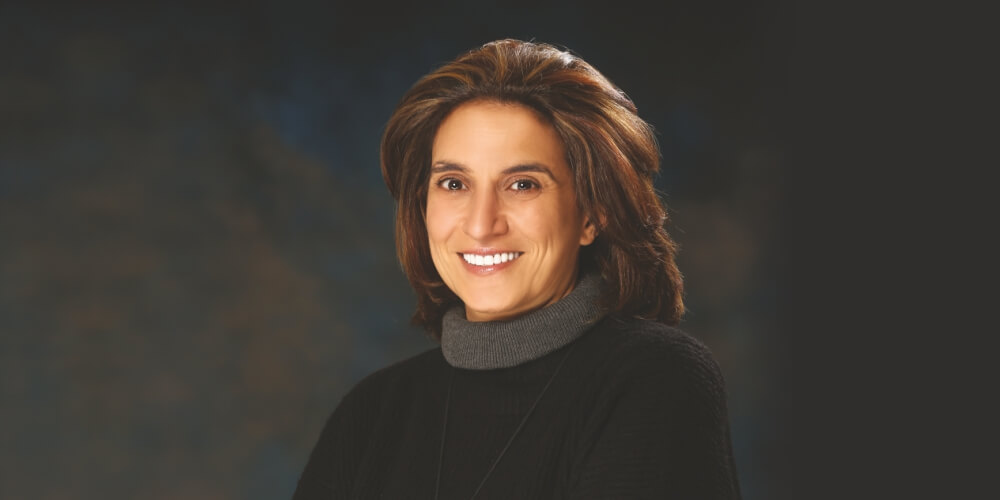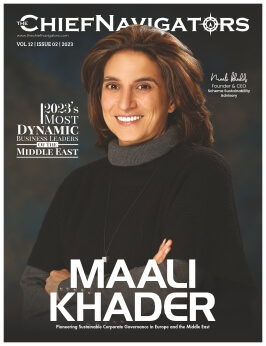Maali Khader: Pioneering Sustainable Corporate Governance in Europe and the Middle East
2023’s Most Dynamic Business Leaders of Middle East

Renowned as one of the top 100 Thought Leaders in Europe and the Middle East for Trustworthy Business Behavior, Maali Khader stands out as the Founder & CEO of Schema Sustainability Advisory. With a career marked by a relentless commitment to reshaping corporate culture, Maali has been a driving force in influencing behavioral changes within organizations. Her advocacy for Corporate Governance (CG) and Corporate Responsibility (CR) has not only created a market for these principles but has also significantly impacted mindsets and practices in the corporate landscape.
Maali’s journey commenced with a formidable educational background in law, earning her LLB and LLM degrees in the UK, and successfully passing the Jordanian Bar and NY Bar exams. This robust foundation equipped her with skills in critical thinking, problem-solving, and a deep understanding of legal systems, laying the groundwork for a distinguished career.
During her legal career, Maali was surprised to notice the absence of ethical business practices in many organizations. This realization fueled her mission to seamlessly integrate ethics into core business practices. In 2007, she shifted her focus to the then-underrecognized field of corporate governance, leveraging her legal knowledge to become an expert in this emerging area. Maali passionately believed in the inseparable nature of corporate governance and sustainability (then known as CSR), a conviction that has now evolved into the contemporary concept of Environmental, Social, and Governance (ESG).
Maali’s dedication yielded significant success, leading to the establishment of the first Sustainability Advisory business in the MENA region in 2007. Since then, she has been at the forefront of groundbreaking initiatives and activities, playing a pivotal role in laying the foundation for the current ESG landscape.
Advisory Roles in Sustainability and Governance
Active engagement in various professional organizations and advisory roles has played a pivotal role in shaping both Maali’s personal and professional development. These diverse involvements have not only broadened her network but have also presented unique opportunities for learning, collaboration, and individual growth.
An intrinsic core value for Maali has been ensuring that the Middle East has a substantive presence in international venues, such as the Global Reporting Initiative (GRI). She believes it is crucial for representatives from the region to actively contribute their perspectives, ensuring their voices are not only heard but also influential. Similarly, with organizations like the Organization for Economic Cooperation and Development (OECD) and the Center for International Private Enterprise (CIPE), Maali emphasizes the importance of the Middle East having the opportunity to actively participate in discussions rather than merely being passive recipients of surveys, findings, and strategies.
In the ever-evolving field of sustainability, staying abreast of ongoing changes is imperative. Maali’s involvement in professional organizations has afforded her the privilege of engaging in collaborative conversations and strategic discussions with other leaders in the field. These interactions have provided invaluable insights into emerging trends, best practices, and innovative solutions. Armed with this knowledge, she has been able to make informed decisions and implement effective strategies in her own work.
Furthermore, participation in diverse groups has exposed Maali to a broad spectrum of perspectives and approaches. This diversity of thought has challenged her assumptions, fostering a culture of continuous learning and motivating her to seek out new knowledge to remain adaptable in a rapidly evolving landscape.
Moreover, these roles have offered Maali opportunities for leadership and mentorship. Serving in advisory capacities has allowed her to guide and support others in their professional journeys. This has not only been personally fulfilling but has also honed her leadership skills and enhanced her ability to communicate complex ideas effectively.
In the dynamic and ever-changing fields of sustainability and governance, these engagements have been invaluable for Maali in navigating challenges, seizing opportunities, and driving positive change. They have equipped her with the knowledge, skills, and networks necessary to make a lasting impact in the pursuit of a more sustainable and responsible future.
Evolving ESG Landscape in the MENA Region and Globally
According to Maali, the ESG and corporate governance landscape in the MENA region and globally has undergone significant changes. Initially, terms like corporate governance, CSR, sustainability, and ESG were unfamiliar, with discussions centered on definitions. Now, the focus has shifted to how and, in some cases, why.
ESG is recognized as a performance metric measuring an organization’s sustainability. While ESG performance is crucial, the emphasis should be on fostering sustainability within companies.
In the evolving MENA landscape, ESG awareness is growing, although not fully integrated into all business considerations. Companies increasingly acknowledge the importance of sustainable practices for ethical reasons, long-term viability, and competitiveness.
Regulatory attention on ESG has increased, with many MENA countries strengthening reporting requirements. The GCC has introduced its ESG metrics, emphasizing businesses’ role in addressing environmental and social challenges. However, ESG should surpass compliance, being internally driven rather than solely relying on regulations.
Companies in the MENA region are realizing the importance of engaging stakeholders to understand and address concerns, fostering transparent and inclusive practices for sustainable growth and to remain relevant with market needs and demands.
Globally, ESG investing is mainstreaming, with institutional investors integrating ESG factors into investment decisions. This reshapes capital flows and influences corporate behavior, necessitating a balance between mainstreaming ESG and identifying innovative sustainability opportunities.
While environmental concerns traditionally dominated ESG discussions, there’s a shift toward social factors. Diversity, employee well-being, and community engagement gain prominence as stakeholders recognize their significance, reflecting a holistic understanding of sustainability. This trend is expected to shape the ESG landscape, influence investor priorities, and prompt businesses to adopt comprehensive sustainability approaches. The risk remains that companies take a tick boxing approach to appease the investors making sustainability a cost issue instead of a cost saving opportunity.
Guiding Light
Maali’s advice is a beacon for those navigating the evolving landscape of practices related to sustainability and governance. She encourages individuals and organizations not to confine themselves to established norms, recognizing that while these practices offer valuable benchmarks, they are not the exclusive path to desired results. According to Maali, the key is to identify an approach that aligns seamlessly with the unique context, organizational goals, and stakeholder dynamics.
The essence of her guidance lies in embracing innovation, adaptability, and agility. Maali advocates for a creative, out-of-the-box mindset and underscores the importance of cultivating a holistic perspective while constantly adapting and learning. Leading with empathy and inclusivity is highlighted as a powerful driver, with the potential to yield unexpected positive outcomes. Maali emphasizes the crucial role of capturing and understanding the broader impact being created.
Acknowledging that results in this space unfold over time, Maali stresses the virtues of patience and persistence. Leading by example is positioned as the most effective way to realize desired outcomes, with the understanding that success is replicable. In essence, Maali’s advice encourages a dynamic and open-minded approach to sustainability and governance, emphasizing the importance of tailoring strategies to individual contexts while maintaining a commitment to ongoing improvement.
Multifaceted Vision
Maali enthusiastically shares her dynamic and ever-evolving focus on multiple fronts, akin to a revolving door that continually presents new opportunities and projects. Currently, her attention is directed toward several impactful initiatives:
- Integrating Sustainability into Core Business Functions: Maali is dedicated to embedding sustainability at the heart of businesses. She emphasizes the need for effective sustainability teams that transcend departmental silos. By fostering collaboration and engagement across various functions, these cross-functional teams can identify and implement sustainable solutions. Maali works with the sustainability champions across the different departments creating a common goal and focus for them so that the business can further its sustainability commitment.
- Purpose-Driven Business in the Post-COVID Era: In the post-COVID landscape, many organizations are playing catch-up, potentially losing sight of their purpose. Maali is excited about working with these organizations to help them rediscover and realign with their purpose in the context of a world that values a balanced social, environmental, and economic impact over the traditional bottom line.
- Launching a Sustainability Communication Department: Recognizing the crucial role of communication in sustainability, Maali is working on launching a new department. This initiative will focus on stakeholder engagement, creating employee buy-in, and identifying social initiatives that align with an organization’s purpose.
- Executive Coaching for Sustainable Leadership: Maali is addressing the challenge of instilling a sustainable mindset from the top down. Rather than focusing on policies, her approach involves creating sustainable practices and nurturing cultures. To facilitate this, she is launching an executive coaching practice aimed at helping leaders not just manage but lead sustainability initiatives by leveraging available resources.
- Upcoming Book Project: On a personal level, Maali is thrilled to announce her involvement in a new book project. While details are currently under wraps, she anticipates the book to be ready for publication by the first quarter of 2024.
Through these diverse endeavors, Maali continues to exemplify her commitment to driving positive change, fostering sustainability, and shaping a purpose-driven future for businesses and leaders alike.
Harmony in Heritage
In her vision for the future, Maali foresees a pivotal role for sustainable practices and governance in the business landscape, especially in the Middle East. She firmly believes that these practices are already deeply embedded in our behaviors, even if we may not explicitly label them as such. According to Maali, these practices resonate with our cultural heritage and are inherently connected to fundamental Sharia concepts.
As we look forward, Maali envisions leveraging these cultural strengths, belief systems, and time-honored practices as a global benchmark. This approach would enable the crafting of a distinctive and compelling sustainability narrative that sets the region apart on the world stage. By recognizing and celebrating the unique approach to sustainability and governance rooted in cultural values, the aim is not only to make a positive impact on local communities but also to inspire and influence the broader global business community. The integration of cultural values with modern sustainability principles, in Maali’s view, will be a powerful force in shaping a more sustainable and prosperous future for the Middle East.
Shaping the Future of Business
Recognizing the pivotal role sustainability plays in the modern business landscape, Middlesex University took a significant step by introducing a Sustainability MBA program at its Dubai campus. Maali found herself chosen for a leading role in this initiative, a decision rooted in her extensive experience and fervent passion for the field. In her view, the key to ensuring the success of sustainability lies in its integration into every facet of business and in the mindset of every leader.
Embracing the opportunity as a guest lecturer, Maali seized the chance to not only impart knowledge but also to shape the approach to business through the lens of sustainability. Her overarching objective is to instigate a paradigm shift wherein sustainability becomes an inherent aspect of every decision, action, and process. Maali firmly believes that through a collective commitment to sustainable practices, a more balanced and prosperous future can be forged for both businesses and the planet.
Teaching a new generation of MBA graduates aligns perfectly with Maali’s vision. In her role, she works closely with her students, guiding them in recognizing and exploring opportunities to seamlessly integrate sustainability into their respective industries. By equipping them with the requisite knowledge and tools, Maali is confident that her students will emerge as catalysts for driving positive change towards a more sustainable future.
Website: schematt.com



